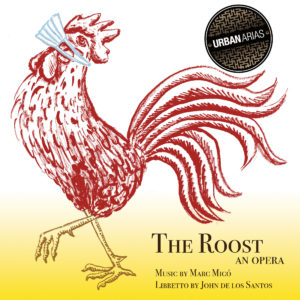When composer Tom Cipullo recommended I take a look at a new piece called Lucy by John Glover and Kelley Rourke, I was immediately interested – Tom is one of my favorite composers, and a suggestion from him is worth paying attention to. So I asked for a perusal score and a recording, and learned that Lucy was about . . . a chimpanzee.
“Tom!” I thought to myself. “Come on. Animals onstage? Did you send me this because I cut Josephine Baker’s cheetah from Josephine? Is this a little dig? I thought you were over that.”
But I did take a look and a listen, and it wasn’t long before I decided to produce the opera. Lucy is based on a real story, as you’ve read elsewhere on this website – the real story of Maurice Temerlin, and the cross-fostering program at the University of Oklahoma. Temerlin and his wife, Jane, adopted a chimpanzee at birth, and raised her in their home, with their biological son, Steve. This story was the subject of a great piece on RadioLab, which you can listen to here: http://www.radiolab.org/story/91705-lucy/.
It’s an amazing story – and a very sad one. I’m probably not alone in thinking that adopting a chimp to study the primate mind sounded like a fascinating idea, without thinking through what it might mean to try and introduce a member of another species into a way of life that was so different from her natural one. As humans, we’re intrigued by our similarities to apes, but our differences are indeed enormous.
That’s the story the opera tells: the incredible but harrowing journey undertaken by Temerlin, and the unintentional (but wholly foreseeable) havoc it wrought on Lucy. It’s a challenging story to tell onstage (much less without a chimpanzee . . . and no, there is not actual chimp in the opera), and that’s where John and Kelley’s brilliance comes in.
The libretto opens vistas of thought to the audience, and implicitly asks a wide range of moral, ethical, and practical questions, but still remains remarkably succinct. Kelley’s words portray the experiment vividly, but it’s always clear that we’re only seeing it from one side: his. We can try to imagine what Lucy herself thought about it all, particularly when she was transferred to a park in Africa after the situation in the Temerlin’s home became untenable. And yet, to the very end, she saw us – humans – as her people, and whenever one came to visit her, she would react with great joy. Kelley breaks down this complicated tale by taking discrete events more or less sequentially – how quickly Lucy learned to walk, her potty training, her large signing vocabulary, her proficiency with tools, her growing inability to contain her emotions – and crafts a series of numbers which unfold not unlike a song cycle, showing us her development over the years.
When I first started exploring the opera, I was (of course!) relieved that the chimp is not physically in the show, but I wondered if I would miss her presence. Composer John Glover has included her, though, in an inventive way: she is represented in part by a toy piano in the small orchestra. The toy piano has a sound somewhere between a glockenspiel and wind chimes, and evokes a sweet and childlike quality which turns out to be wonderfully appropriate for Lucy. Just as a child can swing quickly between rage and calm, frustration and delight, so too the toy piano part is written to be by turns simple and dissonant, reflecting Lucy’s mood.
The opera is in three parts. Each begins with an an unaccompanied solo for baritone, and then the orchestra joins in. The overall sound of the piece traces an arc from pleasing harmony in Lucy’s early years, veering towards dissonance as she grows up and the interactions between her and the Temerlins become increasingly strained, back to an aching beauty as Temerlin remembers the good moments while contemplating her ultimate fate. I like how John doesn’t shy away from portraying ugliness and violence in the score when the story calls for it, but I also appreciate (as I’m sure you will in the audience) how lovely much of the writing is, and how approachable.
Our origins – the subject is perhaps one of the deepest we can contemplate. This story and this opera give us glimpses of where we came from, and how tantalizingly narrow the gulf between us and other primates seems – and yet how broad it truly is. Lucy gives us insight about what it means to be human – which art, literature, and music can do so well. I am grateful to the authors for bringing this story to life, and writing it for the operatic stage.
– Bob Wood
 Since 90-minute live opera was out, I thought, 13-minute online opera can be in. So I called up John de los Santos, whose short opera Service Provider our audiences had enjoyed so much back in 2017, and he was eager to write the libretto and direct. Then he recommended the wonderful young composer Marc Migó Cortes, who was just finishing his studies at Juilliard. Marc’s music was great, and his score for our new opera, The Roost, is fantastic – really well-crafted and beautiful.
Since 90-minute live opera was out, I thought, 13-minute online opera can be in. So I called up John de los Santos, whose short opera Service Provider our audiences had enjoyed so much back in 2017, and he was eager to write the libretto and direct. Then he recommended the wonderful young composer Marc Migó Cortes, who was just finishing his studies at Juilliard. Marc’s music was great, and his score for our new opera, The Roost, is fantastic – really well-crafted and beautiful.

